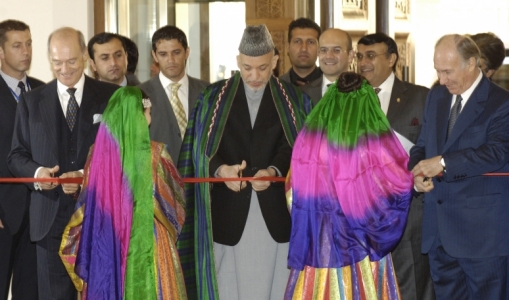Hotel critical to rebirth of Kabul - HOTEL CRITICAL TO REBIRTH OF KABUL - 2003-02-23
The lobby is a dusty heap of rubble and fallen beams. The once-elegant lounge is piled with old sofas, sinks, and beds stripped from guest rooms. The former cigar bar is a series of dank, brick archways -- with no bar and no cigars.
Welcome to the Kabul Hotel. It is none too inviting in its current state, but come this fall the 110-room hotel will reopen with a five-star rating after a $26 million renovation. The project is part of a broader revival of the Afghan capital's hotel and restaurant scene that marks a fresh avenue in the country's efforts to rebuild following decades of war.
In a twist of fate, the person charged with transforming the scarred, Soviet-era pile into a world-class hotel is Ramesh Khosla, the Montreal-based architect who designed the World Trade Center Concourse -- a warren of shopping arcades and passageways at the foot of the towers that was destroyed in the Sept. 11, 2001, attacks.
Amir Mohammed Fasilyar, a former beverage manager of the Kabul Hotel who started his career there 30 years ago cleaning rooms, remembers the busy bar and the whirl of weddings, parties, and concerts attended by Afghanistan's elite.
''It was a beautiful hotel,'' he said recently at the hotel site, where he is assisting in the reconstruction. ''It was full of tourists.''
The hotel has seen its share of Kabul's violent history. In 1979, US Ambassador Adolph Dubs died in a hail of bullets in a room during an apparent rescue attempt, after he was kidnapped and held at the hotel by suspected Islamic extremists.
In 1996, the lobby and several rooms were turned into stores to house the remnants of the Kabul Museum's collection of art and artifacts -- decimated by looting during four years of savage factional fighting that reduced much of Kabul to ruins.
The France-based Aga Khan Fund for Economic Development, which is making the $26 million investment, plans to add more than 70 new rooms with a new wing, plus a coffee pavilion, health club, and a mogul-style garden. The street that currently houses the crushed facade of the hotel will be closed to traffic and turned into a pedestrian promenade.
Khosla said by phone that he will breathe new life into the dilapidated hotel, which will be renamed the Kabul Serena Hotel, by adding a decorative interior with a ''strong, local cultural flavor'' and a new lattice-effect outer wall. To reflect Afghanistan's rich artistic heritage, rooms will be decorated using artifacts from different regions and different tribes.
Rooms at the Kabul Serena will go for $100 to $125 per night for single occupancy.
The project is no mean feat. The original structure is square and grim. A chunk of the hotel was destroyed by a bomb, and doorways that once opened onto guest rooms now open onto emptiness.
But the project has a redemptive quality, Khosla said.
''To have participated in the design of buildings that were destroyed by terrorists living in Afghanistan, and now to be working on this building in Kabul, that's quite something,'' said Khosla, senior partner of the Montreal-based architecture firm Arcop.
The renovation is raising hopes in Kabul that the hotel will spur other business interests.
''It's an incredibly expensive project,'' said Ali Mawji, representative in Afghanistan of the Aga Khan Development Network, of which the fund is the economic development arm. ''It will be a signal that a serious private investor is willing to make a significant investment in Kabul.''
A handful of new restaurants followed close behind the swarm of international aid workers, diplomats, and journalists that descended upon Kabul after the Taliban were ousted in November 2001. Diners can pick from Indian, Chinese, and Italian, or stop in for cappuccino at the new Mustafa Cafe, housed in a guesthouse of the same name run by an Afghan who returned from New Jersey.
But accommodation options are limited to guesthouses, either private or run by aid agencies for their staff, and the Intercontinental Hotel, a featureless building perched on a hillside overlooking the capital.
The Intercontinental, a popular hub for meetings and dining, is also getting a face lift. In October, the Dubai-based Al Yuqoub group bought a 15-year lease for the hotel, pledging to invest $8 million in improvements over 15 months to bring it to five-star level.
Polished floors, a busy Internet cafe, and live music in the restaurant signal small-scale improvements, and John Anjum, the Intercontinental's general manager, plans to add two restaurants and renovate the bar, gym, and pool. The 200 rooms are 70 percent to 75 percent occupied with guests paying about $70 a night.
There also are plans for a big hotel opposite the US Embassy. The prospective investors, from the United States and Turkey, are in talks with the Hyatt about managing the hotel and are reportedly close to a deal.
This story ran on page A22 of the Boston Globe on 2/23/2003.
- 4152 reads
 Ismaili.NET - Heritage F.I.E.L.D.
Ismaili.NET - Heritage F.I.E.L.D.